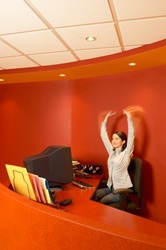Americans Spend HOW Many Hours a Day Watching ‘Screens’?
The Consequences … and Help
by www.SixWise.com
American adults spend an average of more than eight hours each day in front of screens, including televisions, computer monitors, cell phones and others, according to the Video Consumer Mapping study.
|

Americans spend eight hours in front of screens a day.
|
The study, conducted by Ball State University's Center for Media Design (CMD) and Sequent Partners for the Nielsen-funded Council for Research Excellence (CRE), sheds some light on just how much time Americans spend not only sitting, but sitting and staring at screens.
Broken down, here’s a look at what the study found:
- The screen that gets the most viewing time is the television, at more than five hours a day for the average American
- People between the ages of 45 and 54 spent the most time in front of screens -- over 9.5 hours a day
- Adults spend an average 142 minutes a day in front of computer screens
- Adults spend an average 20 minutes a day engaged with mobile devices
What are the Consequences of All This Screen Time?
Although no one under 18 was included in the study, spending too much time in front of screens has been linked to behavior problems, difficulty with attention, poor school performance and obesity in children. Health experts often recommend that kids limit their screen time to two hours a day or less for these very reasons.
For adults, who are spending four times that amount on screens each day, is it reasonable to think there may be similar risks? Probably, yes.
At least one study has shown that screen time was associated with an increased risk of metabolic syndrome, a cluster of symptoms that significantly increases your risk of heart disease, stroke and type 2 diabetes, in young adults -- even after adjusting for physical activity levels.
And a Canadian study showed that screen time is linked to obesity in adults. After surveying 42,600 men and women, researchers found:
- Those who watched more than 21 hours of TV a week were 80 percent more likely to be obese than those who watched 5 hours or less.
- Men who spent a lot of leisure time in front of a computer were 20 percent more likely to be obese, and women 30 percent more, than those who did not.
|
Use Your Screen Time to Get Healthier!

Stretching Toward a Healthier Life on DVD gets our top screen-time recommendation for five key reasons:
- It presents 15 stretches that stretch all the key muscles groups throughout your entire body (a benefit you will NOT get by just sitting and watching TV!).
- It only takes about 15-20 minutes per day total to do the complete stretching.
- Stretching expert and host Jacques Gauthier and his wife Dorothee Lavoie demonstrate each stretch in their entirety, including insights on what NOT to do.
- In addition to stretching nearly 100% of the muscles in your body, Gauthier chose 15 stretches that you'll find actually feel good and are easy to do (many stretches in other programs are not).
- The production quality of the video and sound is excellent. (Many other DVD productions on stretching are not.)
Find out more about Stretching Toward a Healthier Life with FREE SHIPPING for a Limited Time!
|
Interestingly, people who spent time reading, another sedentary activity, were not more likely to be obese, which suggests there’s something unique about screen time that makes it particularly damaging to your health.
The researchers offered a variety of explanations for this, including the tendency people have to mindlessly eat junk food while watching TV. Further, your metabolic rate is extremely low while you watch TV -- only slightly higher than when you’re sleeping -- which may be another factor.
Want to Cut Back on Your Screen Time?
Television viewing takes up the majority of adults’ screen time each day, so if you want to cut back watching less television is essential.
One of the best ways to prioritize where watching TV should rank in your life -- and to stay motivated to reduce TV time -- is to create a simple list of all the things that you (or your kids) need or have always wanted to do but "never seem to have the time to do." (When you do this, most people will notice how "Watch more TV" rarely lands on that list!)
Rank the items you come up with and then dedicate yourself to achieving them ... and keep the list right by the television (or by the remote control) to remind you there are more important things in life whenever the "TV craving" strikes.
If spending time at your computer is more the issue, use the technique above to cut back on leisurely use. If you’re stuck behind a computer for work purposes, you can make it easier on your body by:
- Moving around often. Your body can only tolerate being in one position for about 20 minutes before it starts to feel uncomfortable, according to the Mayo Clinic. About every 15 minutes, stand, stretch, walk around or change your position for at least 30 seconds.
Even better, in 15-20 minutes you can complete Jacques Gauthier’s wonderful Stretching Toward a Healthier Life DVD.
- Looking away from your computer screen often. Focusing on a computer screen for too long can lead to dry eyes and eye fatigue. Be sure to change your focus often, looking at a point in the distance, and blink regularly to keep your eyes moist.
- Keeping your computer monitor in a healthy position. This means directly in front of you, but at least 20 inches away. The top of the screen should be at or below your eye level, and it should be perpendicular to the window (to reduce glare), according to OSHA.
Recommended Reading
TV and Video Gaming During Weekdays Does Harm Student Performance
Will Watching TV Make You Mean? This and Other Risks of Too Much Television
Sources
Yahoo Tech March 27, 2009
The Canadian Press June 18, 2008
Journal of Public Health Advance Access March 28, 2008